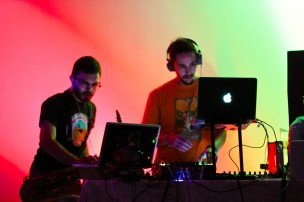
Trisha Arora/Photo Editor
On Friday night, Aural Wes brought Rewrote and Archie Pelago to Eclectic for an experimental music show. Peter Colombo, a.k.a. Rewrote, deejays for the collective M/O/D and came to Wesleyan from Brooklyn, NY to play a mixed set. Archie Pelago, a Brooklyn-based jazzy trio with a classical-meets-electronic sound, followed Rewrote, playing to a lively, full audience.
Rewrote played the kind of fast and fun music that you can’t listen to without wanting to dance, switching from an electronic track to a remix of Ginuwine’s “Pony.” The hip-hop influence on more traditional dance music was surprising and refreshing, and the beat wasn’t overpowering to the melody itself. Rivaled with student band Grand Cousin, who played at Earth House simultaneously, the turnout was inadequate for the powerhouse mixes Rewrote turned out. Rewrote has also noted that other DJs from the M/O/D collective and himself may return to campus next semester for a group show if student interest is high enough.
Archie Pelago took the stage to a gathering audience as the music ascended to a darker, rock sound. The music upheld the integrity of dance music itself while inserting jazz references, using a cello, trumpet, and saxophone. The trio and Rewrote’s solo act both served up music aiming to get students moving, and the show lifted up an otherwise average Friday night.
The Argus got the chance to sit down with Rewrote before his show to chat about raves, frats, and the process of remixing.
The Argus: How did you get involved in the music industry?
Rewrote: When I was a kid I bought Daft Punk records because I went to my first rave as a teenager….I knew about disco because my dad was like a curator of music. He taught me about reggae and disco and Stevie Wonder….Being at that rave took out all the history and made it just about dancing. And just being there for that moment and just enjoying life…I had a major paradigm shift….Being in a dark room with loud sounds and everyone dancing was so unbelievably appealing to me and I knew that was what I was going to do. I started producing music and always had dance music in mind, just being in that hot, sweaty room.
A: So if you were to describe your ideal audience, would it be kids dancing in a sweaty room?
R: Probably, yeah. Also kids that are just open minded, and it isn’t necessarily about drawing points of reference or comparing music to other music, it’s just about hearing something new and it making you move your body.
A: Who are your strongest musical influences?
R: If I’m just cooking a meal or on a train I’ll listen to jazz or reggae, so [my music] is not necessarily derivative of other electronic music.
A: Do you have a favorite artist or style to remix?
R: I would say right now, in terms of what dance music is, there’s a lot more cruise. I definitely like a lot of what’s coming out of London right now….There’s a sister label called Fade to Mind that aesthetically I’m really into. It’s about club readiness, but at the same time it’s very dark and guttural.
A: How does your solo act as Rewrote compare with what you do with M/O/D?
R: In M/O/D we all write with rap in mind. We’re very hip-hop oriented. But my solo stuff is more geared to the dance crowd, even though I will play hip-hop. And I don’t consider myself strictly a dance DJ because I do play rap music, and it’s more of an urban format.
A: Can you tell me a little bit about your process when you make your remixes?
R: With songs, usually I start with drums because it makes the most sense for dance music and seems like the best place to start. Though sometimes I do start with baselines or leads or anything. I’m a pianist at heart, so I’m not as rhythmically oriented as I am oriented with the shapes of chords. Sometimes it’ll be a chord progression, but a lot of the rhythms I choose are just dance rhythms. Usually I start with drums and then I build up a baseline and chords and then I add melodies and incidentals.
A: Do you prefer for songs to bear a resemblance to their original form when you remix them, or do you like them to sound completely new?
R: I like repurposing elements of songs in a remix because if it’s more melodic, then you can always re-harmonize or put more cords under the melody to get a different result or evoke a different mood. But if it’s more rhythmic, I like for things to stay true to the original because some rhythmic themes in dance music keep songs together. But it really depends. If it’s more vocal music, I think fucking around with chords and shapes can work to your advantage.
A: Have you played at a college before?
R: I played at Sarah Lawrence a couple of months ago, and before that, at Texas A&M, and [the latter] was crazy, because it was a fraternity event….I never got the full frat experience, but there it was the full beer drinking, punching people in the face fraternity. And it was at a chili festival! They had two thousand dollars of Keystone Light. By the end of the night, I played two nights in a row, and the floor was just mud. It was unbelievable. But Sarah Lawrence reminds me a lot more of Wesleyan.
A: Anything else you’d like our readers to know?
R: Have me come and play your college again, I’ll bring some of my friends, and we’ll have a hell of a time.